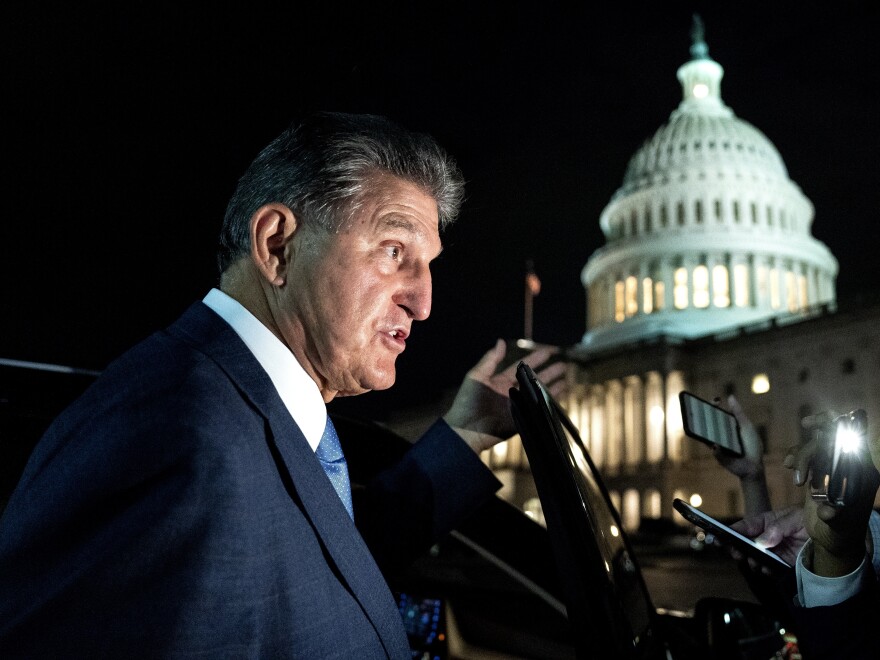President Biden had promised to halve U.S. greenhouse gas emissions from 2005 levels by 2030, but an essential tool the administration planned to use to achieve that goal now appears out of reach.
The New York Times reported Friday that Sen. Joe Manchin, a conservative West Virginia Democrat, has indicated to the White House that he opposes the key climate measure in Biden's multitrillion-dollar climate and social programs package.
The president needs the support of all 50 Democratic senators in order to pass the measure through a process known as reconciliation.
The program in question is the $150 billion Clean Electricity Performance Program, which would financially reward utilities that transition to renewable energy and penalize those which do not. Experts say that the program would sharply reduce greenhouse gas pollution tied to electricity generation — which today accounts for roughly a quarter of U.S. emissions.
Manchin is at odds with his Democratic colleagues
Manchin, who leads the Senate's Energy and Natural Resources Committee, said during an appearance on CNN in September that energy companies are already transitioning to clean energy.
"Now they're wanting to pay companies to do what they're already doing," he said. "Makes no sense to me at all for us to take billions of dollars and pay utilities for what they're going to do as the market transitions."
Manchin's office did not immediately return a request for comment Saturday.
Sen. Tina Smith, a Minnesota Democrat and champion of the clean energy measures, said in an interview with the Star Tribune newspaper that Manchin's characterization is "just not right."
"In fact, what we're doing is we're providing utilities with support, so that they can rapidly add clean power without raising utility rates," Smith said.
Ties to the fossil fuel industry
Coal is a dominant industry in Manchin's home state of West Virginia.
As of 2019, the state is the second-largest U.S. coal producer and relies on the fuel for 91% of its energy needs. The energy sector accounts for 6% of the state's employment, compared with a national average of roughly 2%.
The senator also has personal financial ties to the fossil fuel industry.
Last year, according to his public financial disclosure, Manchin received about $492,000 in dividends on stock from Enersystems, Inc., the coal business he founded in 1988, which is now controlled by his son Joseph. According to OpenSecrets, which tracks political fundraising, Manchin is the top recipient of donations from the oil and gas and coal mining industries this election cycle.
After news broke of Manchin's reported opposition to the clean energy program, Smith issued a warning to the White House on Twitter.
"Let's be clear: the Build Back Better budget must meaningfully address climate change," Smith said, using the administration's branding for the legislative package.
"I'm open to different approaches, but I cannot support a bill that won't get us where we need to be on emissions," Smith said. "There are 50 Democratic senators. Every one of us is needed get this passed."
Smith told NPR this month that she and Manchin have been in regular contact about Manchin's concerns.
U.S. credibility is on the line
In two weeks, world leaders will meet in Scotland for a major United Nations conference on climate change, COP26.
President Biden and John Kerry, his climate envoy, have been working to build U.S. credibility on climate issues after years of inaction and climate change denialism.
In an interview this week with The Associated Press, Kerry said that the administration's trouble passing its own climate policies hurts the effort to spur climate action abroad.
"I'm not going to pretend it's the best way to send the best message. I mean, we need to do these things," Kerry said. He said that if Congress fails to pass significant climate change legislation, "it would be like President Trump pulling out of the Paris agreement, again."
A crucial moment for the health of the planet
Kerry also indicated that the conference talks are likely to fall short of securing the pledges that would be necessary, if met, to limit global warming to under 1.5 degrees Celsius, or 2.7 degrees Fahrenheit, from pre-industrial levels.
Under current worldwide commitments, global emissions are expected to rise by about 16% in 2030, compared to 2010. That would put the planet on track for more than 4 degrees Fahrenheit of warming by 2100.
At that point, rising sea levels would inundate coastlines, extreme heat waves would be significantly more common and more intense floods and droughts would potentially displace tens of millions of people.
Lauren Sommer contributed reporting.
Copyright 2022 NPR. To see more, visit https://www.npr.org.


